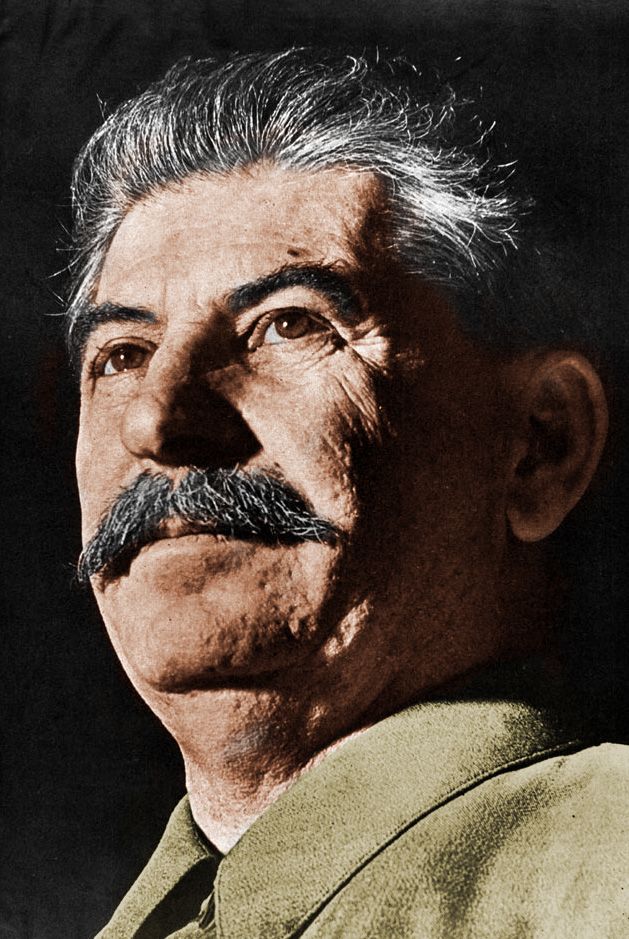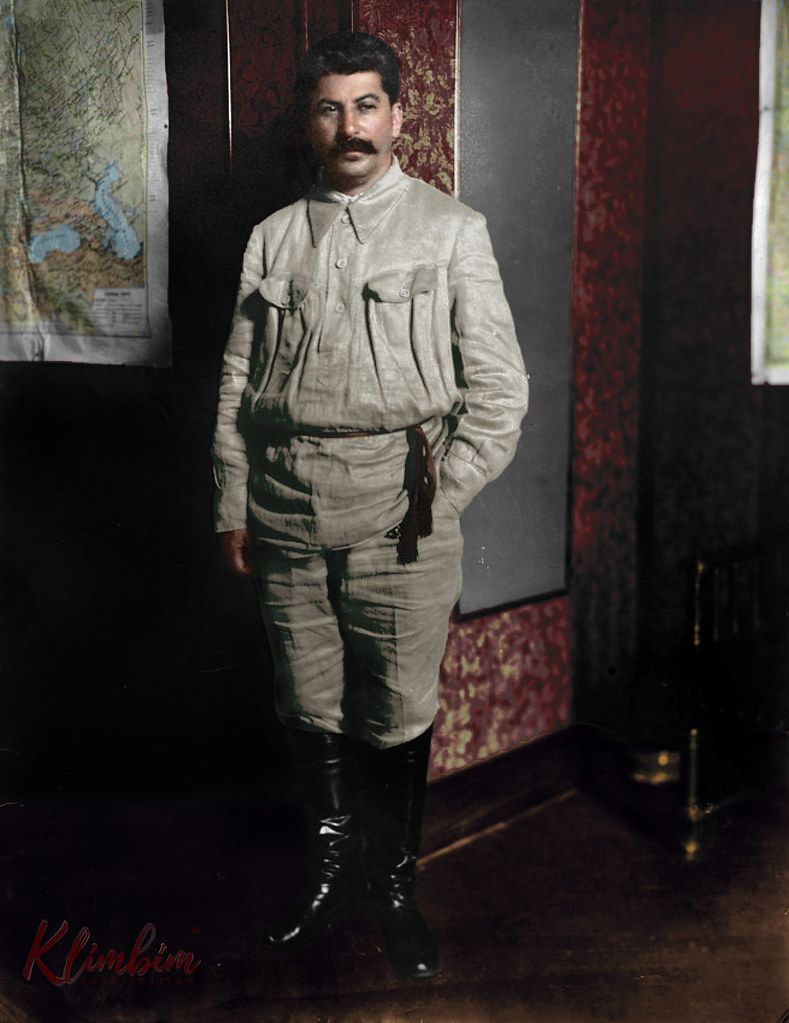70th Anniversary of the Death of J.V. Stalin
March 5, 1953
The Life and Work of J.V. Stalin

J.V. Stalin died on March 5, 1953, 70 years ago. He left a socialist system constituted of 12 countries at a time the world was engaged in a historic struggle between democratic and anti-imperialist forces, on one side, and imperialist and anti-democratic forces, on the other. Stalin and the Soviet Union supported the anti-imperialist and democratic forces, the cause of the peoples of the world and peaceful co-existence between countries with different and even opposite economic and political systems. Following his death, events unfolded which finally led to the collapse of the Soviet Union and of the eastern European states between 1989 and 1991.
As is the case with the life and work of all the personalities of the 20th century, the assessment of the life and work of J.V. Stalin is on-going. This is because the period in which he lived and worked was the battleground between socialism and capitalism and to this day remains the fighting ground between the forces of renewal and the forces of retrogression. Assessments have been given in the past according to the ideological convictions of the assessors. People will yet make their own judgments in the present and future as well. We are confident they will look at the name and work of Stalin favourably.
During this period when revolution is in retreat and there is an urgent need for renewal, it is necessary to assess various events and personalities of the 20th century on the basis of the objectivity of consideration. There is no place for glossing over important matters and making judgments on the basis of prejudice. For example, the Anglo-American imperialist propagandists attributed the collapse of the former Soviet Union and people’s democracies in eastern Europe to Stalin, declaring that it proved socialism and communism were failures.
Stalin died nearly 40 years prior to the collapse of the Soviet Union. How is it that from the time of Nikita Khrushchev to that of Mikhail Gorbachev, during which the leaders of the Soviet Union were openly anti-Stalin, none of the contradictions gnawing at the base of the system in the Soviet Union were resolved? How is it that they transformed the Soviet Union into a military-industrial complex and destroyed its socialist economy, which put the Soviet Union in deep crisis and finally led it to its collapse? How is it that they colluded with the U.S. against revolution and socialism and contended for world domination?
As was the case with Khrushchev, so too with those who followed him — they not only blamed Stalin for whatever problems existed but, most importantly, none of them analyzed and summed up the actual conditions of their times. They did not find out what was wrong at that time. They did not resolve the contradictions within the system in favour of the working class and people, in favour of the advance of the society.
 Those who hate Stalin and concentrate their attacks on his personality and honour are either misled or afraid to analyze and discuss in an unprejudiced manner. Attempts to reduce discourse to either being for Stalin or against him, do not look at the period during which Stalin was at the head of the Communist Party of Soviet Union (Bolshevik) and the state of the Union of Soviet Socialist Republics. This covers the period from the time V.I. Lenin died on January 24, 1924 to the day Stalin himself died.
Those who hate Stalin and concentrate their attacks on his personality and honour are either misled or afraid to analyze and discuss in an unprejudiced manner. Attempts to reduce discourse to either being for Stalin or against him, do not look at the period during which Stalin was at the head of the Communist Party of Soviet Union (Bolshevik) and the state of the Union of Soviet Socialist Republics. This covers the period from the time V.I. Lenin died on January 24, 1924 to the day Stalin himself died.
This is an opportune time to discuss the Stalin period in the Soviet Union and the experience of socialist revolution and socialist construction. It is also incumbent upon those who wish to take up the historic task of renewal to examine the role of other countries and personalities during the same period and the 40-year period which followed, known as the Cold War period, and what has happened since then. Far from engaging in this analysis and objective assessment, the enemies of change zero-in on slandering the personality of J.V. Stalin as well as blocking discussion today by turning the serious concerns of the people over matters of war and peace into personality politics, scandal mongering and nonsense about the world being divided between allegedly progressive liberal democracies which uphold human rights and want peace and democracy because they follow what they call a rules-based international order and backward autocracies that want hegemony, oppose human rights and are warmongering. Disinformation to ensure that the objective and subjective reality of that time and the one that followed are not discussed dispassionately is for purposes of denying the peoples of the world of an outlook on the basis of which they can turn things around in a manner that favours them today.
How is it possible to deal with the problems of the economy without analyzing the experience of the construction of socialism? How is it possible to deal with the problems of democracy at this time, the period of renewal, without assessing what has been achieved in the sphere of the political process on the world scale? There is a need to sum up the achievements in the sphere of theory, as well, and draw the warranted conclusions in order to enrich social science. This is crucial for the renewal of the society.
Speaking objectively and without paying any attention to anyone’s personal prejudices or ideological preferences or beliefs, it has to be recognized that socialism was built in the Soviet Union and that this was an entirely new system. No such system existed in the world before. Stalin was also the architect of the victory of the world over Nazi-fascism. This too was a new experience. For the first time in recent history, a world crisis of the dimensions of the Second World War was resolved in favour of the peoples. This victory over fascism transformed the ratio of class forces which, for the first time in human history, favoured socialism.

Stalin at the XV Congress of the Communist Party of the Soviet Union (Bolshevik), December 1927.
Stalin was also the architect of turning into life the policy of peaceful coexistence between differing systems and states. The new social system, the socialist system based on the theory of Karl Marx, Frederick Engels and Vladimir Ilyich Lenin, to which Stalin also made important contributions, was only in its initial stage. It had yet to develop in the course of the class struggle against all those forces internally and externally standing in its way.
The death of J.V. Stalin however was a signal to all enemies of socialism to get to work and destroy it, before it could assume permanence in the course of its development to creating a communist society, without classes or any form of exploitation and oppression so that the world could stand united as one humanity of fraternal peoples. A decisive element for this advance was the uninterrupted development in the economic sphere and deepening and broadening of democracy in the political sphere, so as to create and strengthen a mass democratic political process which ensures it is the working class and other working people who wield the political power. The role of the communist party and mass organizations of collectives of all kinds is to organize the working class and people to participate in defining and defending the general interests of the society so that the individual and collective interests of its members are harmonized and affirmed.
The economy develops on an uninterrupted basis when more is put back into it than is taken out, ensuring that the well-being of the working population and of those who have retired and the rearing of the new generation, are put in the first place. Consistent with investing in the economy is the steady creation of forms which empower the working class and other working people by renewing the political process and democratic institutions so that only the electorate wields political power.
Far from this taking place in the period after Stalin died, first Khrushchev and then Leonid Brezhnev not only concentrated more and more political power in their own hands but they also militarized the economy. This led to the discontent of the masses and the ruination of the economy. Far from blaming Stalin for the consequences of such measures, the retrogression requires analysis and for warranted conclusions to be drawn.
It cannot be said that there were no problems during the period of Stalin and that he was infallible. Those who raise such issues do so to divert the posing of pertinent questions. What were the problems of socialist construction and socialist revolution? What was going on on the world scale? This should be analyzed just as the problems of capitalism should also be analyzed, far from dismissing them by declaring that capitalism represents individual rights and freedom or by repeating that it is riddled with contradictions and needs to be replaced without elaborating an alternative and bringing it into being.
Posters of the five-year plans for socialist construction in the USSR under Stalin’s leadership.
What is going on all over the world today is there for all to see. Is the world aspiring for a society which is filled with anarchy and violence and in which narrow private interests organized into oligopolies operate as cartels and coalitions and usurp power by force? Do the peoples of the world favour the rule of narrow private interests over the majority and to have retrogression be the order of the day? This is not the kind of society the working class and masses of the people aspire to. The working class already has its own direct experience with such societies as do the peoples of the world.
What kind of society is the future to bring? What changes are to be brought about? These are the pertinent questions. Human civilization cannot go backwards. Motion takes place independent of anyone’s will. The peoples of the world can influence the constant changes and developments to favour them on the basis of putting forward the demand of the present for renewal, by defending and bringing to the fore what was positive from the past and discarding what is negative in the present — all that is beneath the modern standards human beings have given rise to.
Those who hate Stalin do not want to answer the call of history, the call of the present. They are satisfied that the Soviet Union and the eastern European regimes collapsed and do not want to see what the results of that have given rise to in the present. They have a guilty conscience and self-interest in not permitting the summation of the entire historical experience of the over 100 years since the triumph of the Great October Socialist Revolution or the last 80 years since World War II began and ended.
Today it is incumbent on the working class to take stock of the situation and resolve the present-day contradictions in favour of the people. When a summation of this period is done, the name of J.V. Stalin will shine. It is in the interests of the working class to take up his achievements by acting on what history is telling us to do today and turn historic success into historic victory. The name and work of J.V. Stalin will continue to be highly evaluated by all progressive forces.
(Colourized photos: Klimbim.)

|

|
[BACK]




